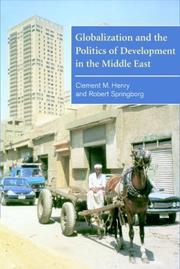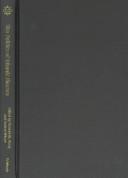| Listing 1 - 3 of 3 |
Sort by
|
Book
ISBN: 9780521737449 0521737443 9780521519397 052151939X 9780511778162 1107207177 0511852509 9786612917431 0511931301 0511932650 0511929978 0511924925 0511778163 1282917439 0511927460 9780511927461 9780511932656 9781107207172 9780511852503 9781282917439 6612917431 9780511931307 9780511924927 9780511929977 Year: 2010 Publisher: Cambridge ; New York : Cambridge University Press,
Abstract | Keywords | Export | Availability | Bookmark
 Loading...
Loading...Choose an application
- Reference Manager
- EndNote
- RefWorks (Direct export to RefWorks)
In this 2010 edition of their book on the economic development of the Middle East and North Africa, Clement Henry and Robert Springborg reflect on what has happened to the region's economy since 2001. How have the various countries in the Middle East responded to the challenges of globalization and to the rise of political Islam, and what changes, for better or for worse, have occurred? Utilizing the country categories they applied in the previous book and further elaborating the significance of the structural power of capital and Islamic finance, they demonstrate how over the past decade the monarchies (as exemplified by Jordan, Morocco and those of the Gulf Cooperation Council) and the conditional democracies (Israel, Turkey and Lebanon) continue to do better than the military dictatorships or 'bullies' (Egypt, Tunisia and now Iran) and 'the bunker states' (Algeria, Iraq, Libya, Sudan, Syria and Yemen).
Globalization --- Mondialisation --- Middle East --- Moyen-Orient --- Economic conditions --- Politics and government --- Conditions économiques --- Politique et gouvernement --- MEA / Middle East - Midden Oosten - Moyen Orient --- 37 --- 331.31 --- 331.30 --- 321.60 --- Geografische economie. Monografieën van streken en landen. --- Economisch beleid. --- Economische toestand. --- Regeringsstelsels en -methodes: algemeenheden. --- Conditions économiques --- Global cities --- Globalisation --- Internationalization --- International relations --- Anti-globalization movement --- Regeringsstelsels en -methodes: algemeenheden --- Economische toestand --- Economisch beleid --- Geografische economie. Monografieën van streken en landen --- Business, Economy and Management --- Economics --- Globalization.

ISBN: 0521626315 052162312X 0511116896 0511154178 0511325193 0511807686 1280162716 0511050577 0511017979 1107114993 9780511154171 9780511116896 9780521626316 9780521623124 9780511017971 9780511807688 9780511050572 6610162719 9786610162710 Year: 2001 Volume: 1 Publisher: Cambridge: Cambridge university press,
Abstract | Keywords | Export | Availability | Bookmark
 Loading...
Loading...Choose an application
- Reference Manager
- EndNote
- RefWorks (Direct export to RefWorks)
At the beginning of the twenty-first century countries in the Middle East and North Africa contend with the threats and opportunities of economic globalization, the driving force of change in the contemporary world. As the authors confirm in their straightforward and, at times, irreverent analysis of the regions' response to these challenges, it is globalization which is the key to an understanding of economic reform. Through an investigation of the structures of state and civil society, including financial systems, they also demonstrate that there is a direct correlation between economic performance and democratization. In other words, the more liberal the polity, the more effective is its economy in responding to globalization. With its interesting and incisive approach to the politics and economics of the Middle East and North Africa, this will be an essential purchase for students and policy-makers and anyone trying to come to grips with economic globalization generally.
#A0511PSA --- Middle East -- Economic conditions -- 1979-. --- Middle East -- Politics and government -- 1979-. --- Globalization. --- Global cities --- Globalisation --- Internationalization --- International relations --- Anti-globalization movement --- Middle East --- Economic conditions --- Politics and government --- Globalization --- #SBIB:327.4H61 --- #SBIB:327.4H71 --- #SBIB:39A4 --- 331.30 --- 331.31 --- 37 --- MEA / Middle East - Midden Oosten - Moyen Orient --- Derde wereld: economische ontwikkeling --- Derde wereld en wereldsysteem, internationale relaties --- Toegepaste antropologie --- Economische toestand --- Economisch beleid --- Geografische economie. Monografieën van streken en landen --- Business, Economy and Management --- Economics --- GLOBALIZATION -- 330.191.4 --- 21ST CENTURY -- 330.191.4 --- Middle East - Economic conditions - 1979 --- -Middle East - Politics and government - 1979 --- -Globalization. --- -Globalization

ISBN: 1474469086 0748653082 0748679715 0748618368 Year: 2004 Publisher: Edinburgh : Edinburgh University Press,
Abstract | Keywords | Export | Availability | Bookmark
 Loading...
Loading...Choose an application
- Reference Manager
- EndNote
- RefWorks (Direct export to RefWorks)
Can contemporary Islamic finance meet the requirements of modern commerce? This book explores the political implications of the accumulation of Islamic capital, analysing the connections between Islamic finance and Islamic political movements in Middle Eastern and North African countries.
| Listing 1 - 3 of 3 |
Sort by
|

 Search
Search Feedback
Feedback About UniCat
About UniCat  Help
Help News
News